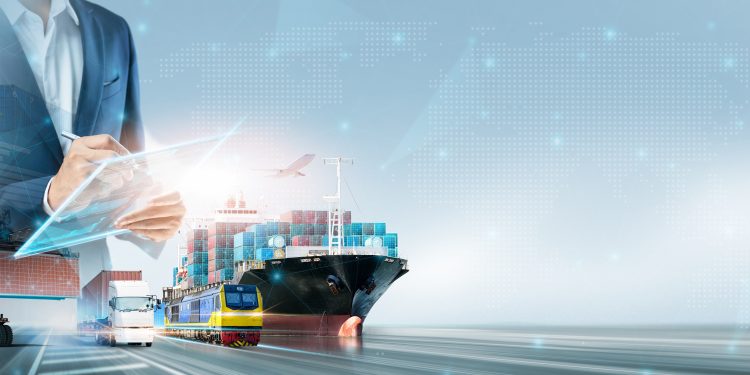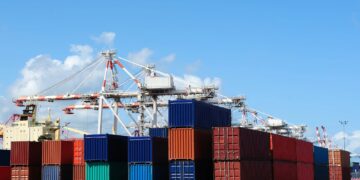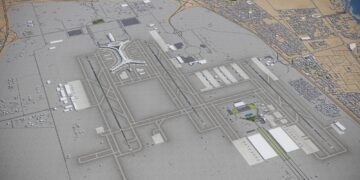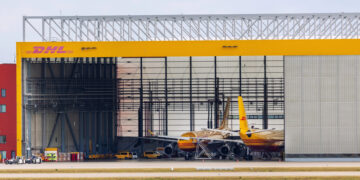Advancements in technology are propelling the express logistics field forward, with the Internet of Things (IoT) at the forefront, revolutionizing how supply chains are monitored and managed. The use of smart labels and sensors permits the real-time observation of cargo, enhancing inventory control and easing traffic jams in the flow of goods. These innovations are vital for logistics operators to oversee environmental conditions, thereby preserving the integrity of delicate merchandise throughout their journey.
Additionally, Artificial Intelligence (AI) is making inroads in several sectors of express logistics, including predictive analytics, automated sorting, and customer interaction. AI’s capability to process vast amounts of data allows for the refinement of delivery pathways, anticipation of demand trends, and more effective inventory management. The adoption of AI-powered systems is on the rise, as companies aim to bolster operational effectiveness and reduce overhead, with AI expected to make a substantial impact on productivity in the near future.
Sustainability is also assuming a greater role in the express logistics domain, with consumers becoming more conscious of the environmental footprint of their purchases and seeking greener alternatives. Logistics firms are responding by incorporating alternative energy sources such as sustainable aviation fuel (SAV) and expanding their fleets of electric vehicles (EVs). These initiatives are geared towards curbing carbon emissions and fostering more sustainable delivery methods.
Customer expectations are evolving, with an increasing demand for speedier, more dependable, and transparent services. Innovations in the final leg of delivery, such as drones and self-driving vehicles, are being tested to satisfy these consumer needs. Moreover, advancements in tracking technology and customer communication are being established as standard procedures to guarantee a smooth delivery experience.
The boom in cross-border e-commerce is presenting new prospects and hurdles for express logistics operators. Dealing with complex international regulations, customs formalities, and diverse delivery infrastructures necessitates sophisticated logistics solutions. Companies are investing in technology and forming partnerships to simplify cross-border operations and enhance their international presence.
Turning to the Middle East, the region is quickly emerging as a key player in the worldwide logistics scene, driven by hefty investments in infrastructure and geographical advantages. The UAE’s logistics sector is predicted to see significant growth, with an expected compound annual growth rate (CAGR) of 6.55%, reaching a value of $27.51 billion by 2029. Similarly, Saudi Arabia is on a path to transform itself into a premier global logistics hub, backed by the ambitious Vision 2030 plan.
In the UAE, noteworthy developments such as the expansion of Jebel Ali Port, establishment of Dubai Logistics City, and the growth of Al Maktoum International Airport are set to streamline logistics operations and provide effective multimodal transport solutions. Saudi Arabia is also making remarkable progress with its Vision 2030 strategy, aiming to diversify its economy and decrease its oil dependence. This strategy includes extensive investments in logistics infrastructure, like enhancing port capacities, creating new economic zones, and improving transportation networks. The strategic positioning of the country as an intersection of major trade routes positions it as an ideal hub for regional logistics.
The surge in online shopping activity has propelled the logistics sector in the Middle East, with a particular increase in demand for express delivery services. This is evident in countries such as the UAE and Saudi Arabia, where online purchasing is becoming a norm. This uptick in e-commerce has led to the need for better last-mile delivery solutions and the incorporation of advanced logistics technologies to meet consumer expectations.
The Middle East is also rapidly adopting cutting-edge technologies to improve its logistics capabilities. The integration of IoT, AI, and blockchain is transforming the sector by offering enhanced visibility, efficiency, and security in supply chain operations. Blockchain technology, in particular, is contributing to the transparency and security of logistics activities by providing immutable records of transactions and shipments.
Logistics providers in the region are increasingly adopting eco-friendly practices and technologies to lessen their environmental impact. Initiatives to promote sustainability include the use of electric vehicles for last-mile deliveries, investments in renewable energies, and the implementation of green logistics solutions. Regional governments are supporting these initiatives through regulations and incentives, with the UAE leading several projects to advance green logistics, including the adoption of alternative fuels and the development of sustainable logistics centers.
The Middle East’s logistics industry faces a significant deficit in skilled labor, especially for specialized roles such as supply chain management and warehouse operations. This shortage is driving up labor costs as companies compete for qualified personnel. Bridging this gap requires increased cooperation between private and public sectors to provide the necessary training in logistics and supply chain disciplines.
Although the Middle East is quickly adopting new technologies, integrating these into existing systems poses challenges such as high costs, limited awareness, and data security concerns. Overcoming these obstacles is essential for maintaining a competitive edge in the rapidly changing logistics landscape.
Geopolitical tensions, including conflicts in the Red Sea and broader regional instability, pose significant risks to logistics operations. These problems can lead to supply chain disruptions, resulting in delays and higher costs. Strategic planning, partnerships, and innovative solutions are required to navigate these challenges and ensure the resilience and security of supply chains.
Despite massive investments in infrastructure, some areas still need further development to support efficient logistics operations. While hubs like Dubai and Abu Dhabi boast state-of-the-art facilities, other regions may lack the necessary infrastructure, leading to inefficiencies and higher costs. Furthermore, logistics companies are under pressure to adopt sustainable practices while maintaining cost-effectiveness. Investments in green technologies and alternative fuels are necessary to meet both regulatory demands and consumer expectations for sustainability.
The Middle East offers significant opportunities for logistics growth, thanks to its strategic location at the crossroads of global trade routes and ongoing infrastructure investments. The expansion of ports, airports, and rail networks is enhancing the region’s capabilities as a global logistics hub. The rise of e-commerce in the Middle East presents another significant prospect for the express logistics sector. With an increasing trend towards online shopping, there is a heightened need for quick and dependable delivery services. Logistics companies can leverage this trend by improving last-mile delivery solutions and adopting advanced technologies to meet consumer demands.
The integration of advanced technologies such as AI, IoT, and blockchain provides numerous possibilities to enhance logistics operations. These technologies can improve supply chain visibility, optimize delivery routes, and ensure the security and integrity of shipments. By utilizing these innovations, logistics companies can achieve greater efficiency and cost savings.
Embracing sustainable logistics practices not only meets regulatory requirements but also offers a competitive advantage. Companies that invest in green technologies and alternative fuels can decrease their environmental footprint and appeal to eco-conscious customers. This focus on sustainability can spur innovation and unlock new market opportunities.
Finally, the Middle East can benefit from increased regional collaboration and the establishment of trade agreements. Such collaborations can streamline regulations, minimize trade barriers, and enhance the efficiency of cross-border logistics operations. Working together can also help address common challenges, such as geopolitical risks and infrastructure disparities, fostering a more cohesive and resilient logistics network.
The logistics sector in the Middle East is poised for a significant transformation through digitalization. Advanced technologies like AI, IoT, and blockchain are set to redefine logistics operations, with AI and blockchain expected to improve route optimization, streamline operations, and enhance supply chain visibility by offering secure, transparent tracking from manufacturer to consumer. The rise of smart warehousing, integrating robotics and IoT devices, will also revolutionize inventory management and reduce reliance on manual labor, thus minimizing errors and accelerating processes.
As highlighted, sustainability will play a crucial role in the future of express logistics in the Middle East. Companies are increasingly adopting green logistics practices, such as using electric vehicles for last-mile delivery and integrating alternative fuels. These measures are aimed at reducing carbon emissions and meeting both regulatory requirements and consumer expectations for environmentally friendly delivery options. Government initiatives supporting sustainability will be instrumental in driving these changes.
Ongoing investments in logistics infrastructure across the region will continue to strengthen the Middle East’s position as a global logistics hub. Projects like the expansion of Dubai’s Jebel Ali Port and the development of Al Maktoum International Airport are exemplary efforts to enhance logistics capabilities. The completion of the Etihad Rail project will further revolutionize freight movement by connecting major industrial and logistics hubs. Such infrastructure improvements will facilitate more efficient and integrated logistics operations, supporting the region’s economic growth.
The rapid growth of e-commerce in the Middle East will drive significant advancements in last-mile delivery solutions. Innovations such as drone deliveries, autonomous vehicles, and micro-fulfillment centers will become more prevalent, addressing the increasing demand for fast and reliable deliveries. These technological advancements will enhance the efficiency and cost-effectiveness of the final leg of the delivery process, ensuring that products reach consumers swiftly and reliably.
Geopolitical stability and economic diversification will continue to influence the logistics sector in the Middle East. Countries like Saudi Arabia and the UAE are actively working to mitigate geopolitical risks and enhance economic resilience through strategic initiatives like Saudi Vision 2030. These efforts include diversifying economies away from oil dependence and investing in infrastructure and technology to strengthen logistics capabilities. The









